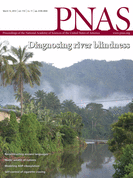 Researchers from The Ohio State University and The Scripps Research Institute are retracting a 2013 paper in Proceedings of the National Academy of Sciences after they uncovered data irregularities.
Researchers from The Ohio State University and The Scripps Research Institute are retracting a 2013 paper in Proceedings of the National Academy of Sciences after they uncovered data irregularities.
The retraction notice for “Somatic hypermutation maintains antibody thermodynamic stability during affinity maturation,” will appear online on Sept. 5. The paper purported to find clues about what makes antibodies stable at different temperatures. In a press release issued at the time of publication, corresponding author Thomas Magliery, of The Ohio State University, said the paper might help pharmaceutical companies make better antibody-based drugs. It has been cited 36 times, according to Clarivate Analytics’ Web of Science.
At some point — we’re not exactly sure when — the authors discovered that the antibody stability data was suspect. According to the notice:
In the course of an examination of data unrelated to this publication, it came to our attention that some of the thermal melt data collected by a single researcher at The Ohio State University contains irregularities.
An OSU spokesperson told us the researcher in question was co-author Shiladitya Sen, a former graduate student in Magliery’s lab.
Sen, along with several other colleagues from the PNAS study, co-authored another paper on antibody stability in 2013, published in the Journal of the American Chemical Society (JACS), “Mutational Analysis of 48G7 Reveals that Somatic Hypermutation Affects Both Antibody Stability and Binding Affinity.” The OSU spokesperson told us that Sen’s co-authors have requested a retraction of that paper as well. That paper has been cited 11 times.
A JACS spokesperson said Editor Peter Stang was out of the country and that no one else was able to comment on the retraction request.
In June 2016, Ohio State revoked Sen’s doctorate in chemistry, which he received in 2013. But the OSU spokesperson declined to comment further, citing federal privacy laws:
No further information on this matter can be shared because of federal guidelines and the Family Educational Rights and Privacy Act.
Sen was the only co-author whose name was not attached to the PNAS notice. In it, his colleagues explained that they reanalyzed the data and came to a similar conclusion, but decided to retract anyway:
We conducted an extensive review of the available primary thermal melt data, re-prepared multiple key protein samples, and carried out differential scanning fluorimetry (DSF) thermal melts in replicate. Our reanalysis supports the basic conclusion of this manuscript that peripheral mutations accumulated during affinity maturation are stabilizing, whereas binding-site mutations are destabilizing. However, we do not have confidence in any of the aggregation/light scattering data that were intended to confirm the primary DSF thermal melt data because none of those primary data could be located, and we are concerned that the appearance of some of the DSF melting curves reported in the paper may have been altered, largely outside of the melting transition. Based on these concerns, we retract the entire report.
They added that “these problems occurred despite blinding of the identities of all samples … as well as regular examination of the melting data by multiple authors throughout the course of this work.”
The exact sequence of events in this story remains unclear. We reached out to last author Peter G. Schultz, a principal investigator at The Scripps Research Institute in La Jolla, California, for more information, but he has not yet responded to our requests for comment by phone and email. We’ll update this post as we hear more.
The PNAS retraction is Schultz’s third and he’s also an author on the JACS paper slated to be withdrawn. In 2009, he retracted papers in Science and JACS where he served as last author. In both cases, the notices said that the researchers were no longer able to do what they had originally reported, which is to insert particular amino acids into proteins. Sen was not a co-author on either of those papers.
The abstract for Sen’s dissertation, about a method to engineer proteins to enhance their stability, is still available online. His LinkedIn page says he is still a PhD candidate at OSU.
Like Retraction Watch? Consider making a tax-deductible contribution to support our growth. You can also follow us on Twitter, like us on Facebook, add us to your RSS reader, sign up on our homepage for an email every time there’s a new post, or subscribe to our daily digest. Click here to review our Comments Policy. For a sneak peek at what we’re working on, click here.